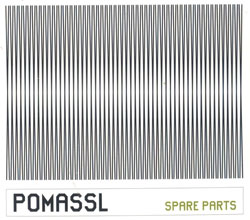
Stare at the digipack's cover too long and you might bring on a toxic attack of vertigo. Much like those black and white elongated bandwidths, Pomassl's music can be just as time-stretched, taut, immersive, and elusive. A longtime experimentalist tweaking about the digital arts, with previous long-players on such labels as Laton and Craft, Pomassl's debut on Raster-Noton ideally weds the artist's sensibilities with a label whose continued evisceration/autopsying of the glitch, of hard drive hiccups, clicks 'n' cuts performed with acute surgical accuracy, has made for a stellar archive of niche music with few parallels amongst contemporary electronica.
Pomassl's colorful palette careens wildly across fifteen tracks of immodest length, a dizzying array of digital flavors that covet microsonic rhythms, fanciful squirts, scrubbed detritus, incumbent noise, and whatever might fall in-between. That he can make the entirety of this recording profoundly musical, even in the broadest sense, handily sweeps aside the usual bristles accorded glitch music, that its very aesthetic negates any sense of playfulness, melody, or prurient attractiveness. Not that Pomassl possesses the slightest contempt for the genre or its audience � this surely isn't new age by any stretch � but it's clear from Spare Parts that he wants his work to endure beyond fanciful 15-minute cycles of fame. Klaus Schulze once spoke of his desires to exact a "music for the future" � Pomassl's crusty silicon synthetix are only too eager to buttress that claim.
Things start out aggressive enough, after the six second intro "Nitro", which segues neatly into the staccato sturm und drang of "Tandem Distiller", stutter-pulses/pauses, distressed hum and all, as some unseen spectre occasionally pronounces his opinions into a black digital maelstrom. "Kalin Tubes" imagines Subotnick lost amongst a herd of attacking helicopters and hordes of insect militia. "Lovozero" shushes about somewhat menacingly until Pomassl introduces a shiny silicon tribal beat that situates the piece firmly in the (musique) concrete jungle. "Kaskada" does like so many budding electronicists do: evoke the spirit of Louis and Bebe Barron's austere forbidden planets and marauding id monsters stomping through a forest of bleep. "Pestrepeller" makes marvelous use of a ping-pong ball as its rhythmic motif, atop which Pomassl daubs varying buzzing, staticky smears while gusty metallic winds whip and bellow. Repeated dipping into this particular synthetic pond only yield further, richer dividends; a better work of modern-day burnished digiflex you'd be hard-pressed to find.
Comments and Feedback:



More Recent Reviews, Articles, and Interviews @ The Squid's Ear...


|

